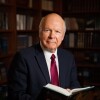To bear has at least two meanings. It means, first of all, to possess, in the sense that a man or woman possesses or bears responsibility or burdens.
Second, it means to express, convey, or declare to others. Spiritual things can be known. We need not apologize for things we know by the power of the Spirit, for they are as real (if not more so) than the things we perceive in the physical world through the five senses.
“I know with a witness that is more powerful than sight,” President Harold B. Lee said to Brigham Young University students just three months before his death. “Sometime, if the spirit prompts me, I may feel free to tell you more, but may I say to you that I know as though I had seen, that He lives, that He is real, that God the Father and his Son are living realities, personalities with bodies, parts, and passions—glorified beings. If you believe that, then you are safe. If you don’t believe it, then struggle for that witness, and all will be well with you.”1
An episode in the book of Alma illustrates the potential power of testimony. A little more than eighty years before the coming of Christ, Alma the Younger, the chief judge or governor, seeing that wickedness was spreading among the …, even to members of the Church, felt the need to resign from his role in government and devote himself full-time to ministry (Alma 9–18).
“Now this he did,” Mormon wrote, “that he himself might go forth among his people, or among the people of Nephi, that he might preach the word of God unto them, to stir them up in remembrance of their duty, and that he might pull down, by the word of God, all the pride and craftiness and all the contentions which were among his people, seeing no way that he might reclaim them save it were in bearing down in pure testimony against them” (Alma 4:19; emphasis added).
► You may also like: Why 2024 could be your most transformative Come, Follow Me study year ever
This very significant verse is a companion with another of Mormon’s comments that, again, attests to the power of the word of God.
In recounting the story of Alma and his missionary companions as they were about to teach the gospel to the Zoramites, Mormon taught: “And now, as the preaching of the word had a great tendency to lead the people to do that which was just—yea, it had had more powerful effect upon the minds of the people than the sword, or anything else, which had happened unto them—therefore Alma thought it was expedient that they should try the virtue of the word of God” (Alma 31:5).
To “try the virtue of the word of God” is to trust or have faith and confidence in the power of sound doctrinal teaching and solid testimony bearing. To those who wonder how they can bear testimony when they are not certain how much of a testimony they truly have, President Dallin H. Oaks said that “some testimonies are better gained on the feet bearing them than on the knees praying for them.”2
Many years ago in one of my Book of Mormon classes at Brigham Young University, after I had finished a discussion of Alma 4:19 and the matter of bearing pure testimony, a student spoke to me after class.
He said: “Brother Millet, I wanted so badly to bear my testimony in yesterday’s fast and testimony meeting in my BYU ward, but I didn’t have anything original to say. I didn’t have a special message.”
His concern illustrates a problem we sometimes see in the Church: the presumption that one has to preach a sermon or make some original contribution to the meeting. The leaders of the Church have repeatedly stated that members of the Church are to be invited to bear brief, heartfelt testimonies and, where appropriate, share faith-promoting experiences. There really is no need for members of the Church to worry one-tenth of a second about coming up with something original to say or about giving a talk.
President Spencer W. Kimball counseled a group of young people gathered in a testimony meeting: “Do not exhort each other; that is not a testimony. Do not tell others how to live. Just tell how you feel inside. That is the testimony. The moment you begin preaching to others, your testimony ended. Just tell us how you feel, what your mind and heart and every fiber of your body tells you.”3
On another occasion, President Kimball said to a similar group: “Now, you are going to give your testimonies this afternoon. I hope that you’ll just open your hearts and let us look inside. … A testimony is not an exhortation; a testimony is not a sermon; none of you are here to exhort the rest. You are here to bear your own witness.”4
“Every missionary yearns for the power to persuade and convince,” President Russell M. Nelson taught. “Nothing you will learn can ever match the power of pure testimony. Doctrines can be debated. Opinions can be argued. Interpretations can be challenged. But no one can dispute a testimony. It is uniquely unassailable.”5 ...
The Apostle Paul wrote to the Saints in Rome: “For whosoever shall call upon the name of the Lord shall be saved. How then shall they call on him in whom they have not believed? And how shall they believe in him of whom they have not heard? And how shall they hear without a preacher? … So then faith cometh by hearing, and hearing by the word of God” (Romans 10:13–14, 17). The Prophet Joseph Smith put it this way: “Faith comes by hearing the word of God, through the testimony of the servants of God; that testimony is always attended by the spirit of prophecy and revelation.”6
There is no way, given our limited perspective in this life, that we can measure the eternal influence of pure testimony. Perhaps only when we are able to look back on the whole of our existence, able to see things as they really were and are, from God Almighty’s point of view, will we be able to sense and feel the powerful coalescence of circumstances, the divinely contrived orchestration of people and events. Maybe then we will be in a position to measure how the power of pure human testimony has made a difference in our own lives.
Notes
1. Lee, “Be Loyal to the Royal Within You,” 103; emphasis added.
2. Oaks, “Testimony,” Ensign or Liahona, May 2008.
3. Teachings of Spencer W. Kimball (1982), 138; emphasis added.
4. Kimball, unpublished address, January 2, 1959.
5. Teachings of Russell M. Nelson, 213.
6. Teachings of Presidents of the Church: Joseph Smith, 385.



